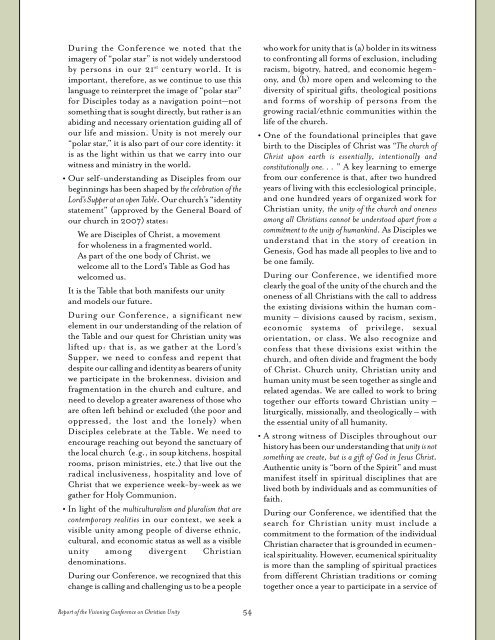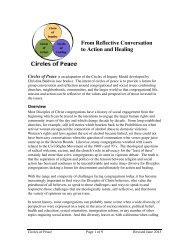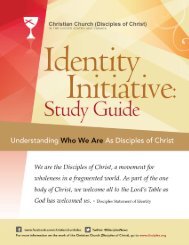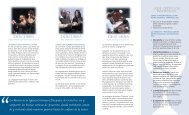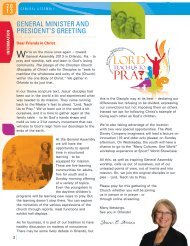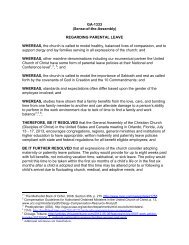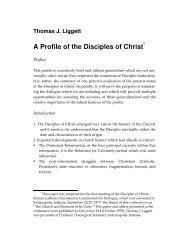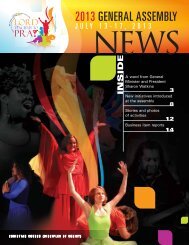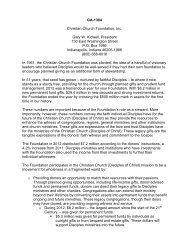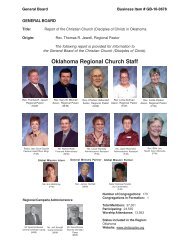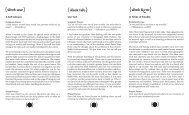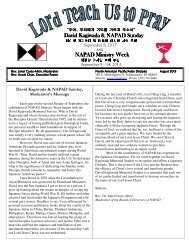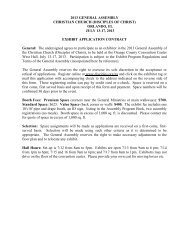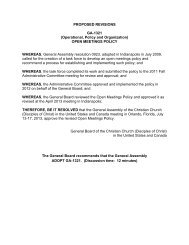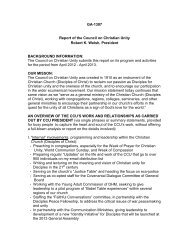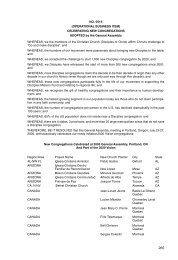RESOURCING THE CHURCH FOR ECUMENICAL MINISTRy A ...
RESOURCING THE CHURCH FOR ECUMENICAL MINISTRy A ...
RESOURCING THE CHURCH FOR ECUMENICAL MINISTRy A ...
Create successful ePaper yourself
Turn your PDF publications into a flip-book with our unique Google optimized e-Paper software.
During the Conference we noted that the<br />
imagery of “polar star” is not widely understood<br />
by persons in our 21 st century world. It is<br />
important, therefore, as we continue to use this<br />
language to reinterpret the image of “polar star”<br />
for Disciples today as a navigation point—not<br />
something that is sought directly, but rather is an<br />
abiding and necessary orientation guiding all of<br />
our life and mission. Unity is not merely our<br />
“polar star,” it is also part of our core identity: it<br />
is as the light within us that we carry into our<br />
witness and ministry in the world.<br />
• Our self-understanding as Disciples from our<br />
beginnings has been shaped by the celebration of the<br />
Lord’s Supper at an open Table. Our church’s “identity<br />
statement” (approved by the General Board of<br />
our church in 2007) states:<br />
We are Disciples of Christ, a movement<br />
for wholeness in a fragmented world.<br />
As part of the one body of Christ, we<br />
welcome all to the Lord’s Table as God has<br />
welcomed us.<br />
It is the Table that both manifests our unity<br />
and models our future.<br />
During our Conference, a significant new<br />
element in our understanding of the relation of<br />
the Table and our quest for Christian unity was<br />
lifted up: that is, as we gather at the Lord’s<br />
Supper, we need to confess and repent that<br />
despite our calling and identity as bearers of unity<br />
we participate in the brokenness, division and<br />
fragmentation in the church and culture, and<br />
need to develop a greater awareness of those who<br />
are often left behind or excluded (the poor and<br />
oppressed, the lost and the lonely) when<br />
Disciples celebrate at the Table. We need to<br />
encourage reaching out beyond the sanctuary of<br />
the local church (e.g., in soup kitchens, hospital<br />
rooms, prison ministries, etc.) that live out the<br />
radical inclusiveness, hospitality and love of<br />
Christ that we experience week-by-week as we<br />
gather for Holy Communion.<br />
• In light of the multiculturalism and pluralism that are<br />
contemporary realities in our context, we seek a<br />
visible unity among people of diverse ethnic,<br />
cultural, and economic status as well as a visible<br />
unity among divergent Christian<br />
denominations.<br />
During our Conference, we recognized that this<br />
change is calling and challenging us to be a people<br />
Report of the Visioning Conference on Christian Unity<br />
54<br />
who work for unity that is (a) bolder in its witness<br />
to confronting all forms of exclusion, including<br />
racism, bigotry, hatred, and economic hegemony,<br />
and (b) more open and welcoming to the<br />
diversity of spiritual gifts, theological positions<br />
and forms of worship of persons from the<br />
growing racial/ethnic communities within the<br />
life of the church.<br />
• One of the foundational principles that gave<br />
birth to the Disciples of Christ was “The church of<br />
Christ upon earth is essentially, intentionally and<br />
constitutionally one. . . ” A key learning to emerge<br />
from our conference is that, after two hundred<br />
years of living with this ecclesiological principle,<br />
and one hundred years of organized work for<br />
Christian unity, the unity of the church and oneness<br />
among all Christians cannot be understood apart from a<br />
commitment to the unity of humankind. As Disciples we<br />
understand that in the story of creation in<br />
Genesis, God has made all peoples to live and to<br />
be one family.<br />
During our Conference, we identified more<br />
clearly the goal of the unity of the church and the<br />
oneness of all Christians with the call to address<br />
the existing divisions within the human community<br />
– divisions caused by racism, sexism,<br />
economic systems of privilege, sexual<br />
orientation, or class. We also recognize and<br />
confess that these divisions exist within the<br />
church, and often divide and fragment the body<br />
of Christ. Church unity, Christian unity and<br />
human unity must be seen together as single and<br />
related agendas. We are called to work to bring<br />
together our efforts toward Christian unity –<br />
liturgically, missionally, and theologically – with<br />
the essential unity of all humanity.<br />
• A strong witness of Disciples throughout our<br />
history has been our understanding that unity is not<br />
something we create, but is a gift of God in Jesus Christ.<br />
Authentic unity is “born of the Spirit” and must<br />
manifest itself in spiritual disciplines that are<br />
lived both by individuals and as communities of<br />
faith.<br />
During our Conference, we identified that the<br />
search for Christian unity must include a<br />
commitment to the formation of the individual<br />
Christian character that is grounded in ecumenical<br />
spirituality. However, ecumenical spirituality<br />
is more than the sampling of spiritual practices<br />
from different Christian traditions or coming<br />
together once a year to participate in a service of


